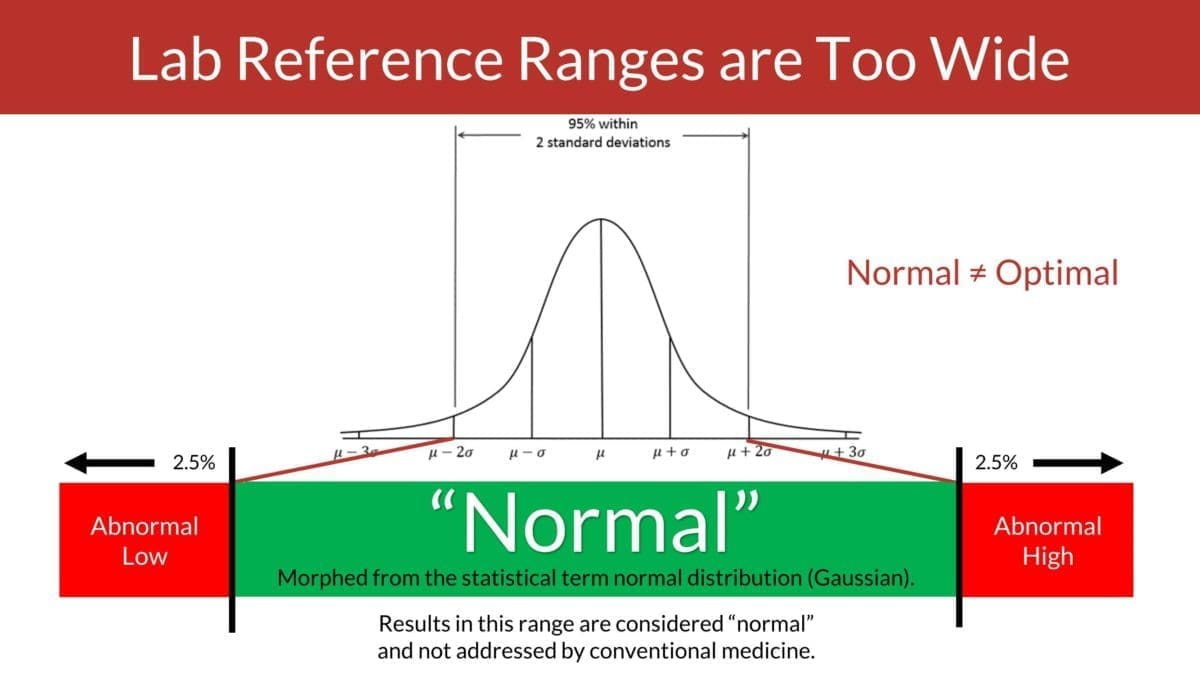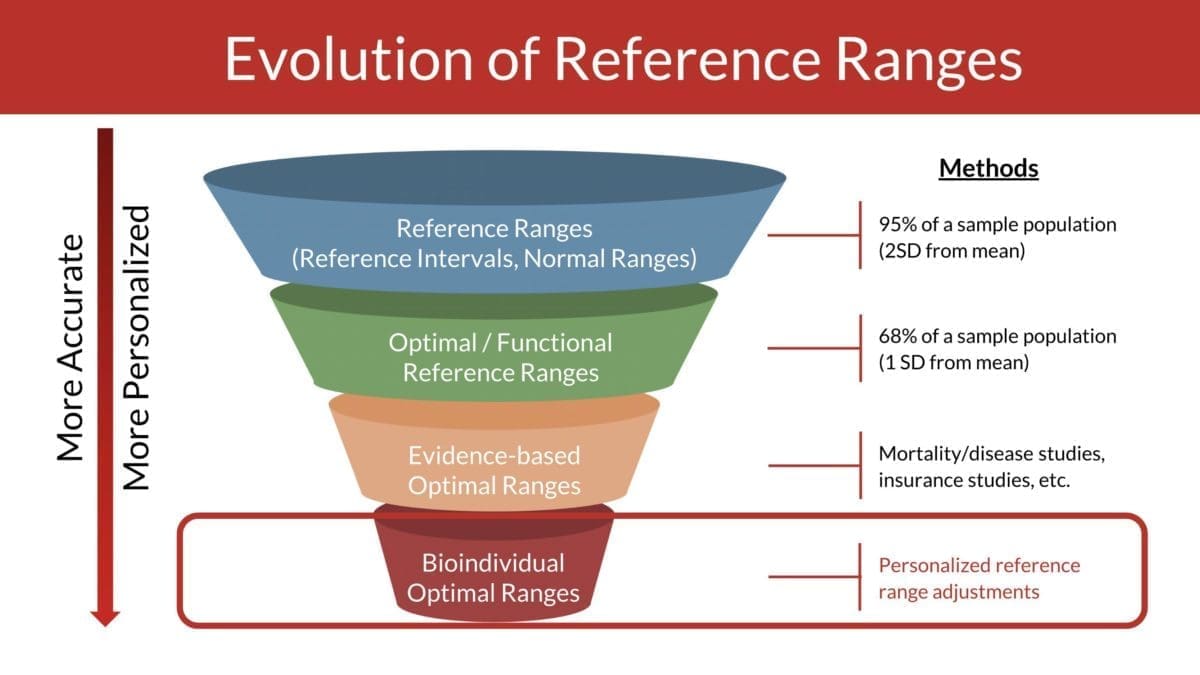Optimal Lab Ranges
When assessing our health through laboratory tests, we often rely on the concept of "normal" ranges. These ranges, provided by medical institutions and laboratories, indicate what is considered typical for a given parameter in the general population. However, the notion of normalcy can be misleading, as it is based on an average that may not represent optimal health. This article will explore why normal lab ranges may fall short and discuss the importance of striving for optimal health instead.
Normalcy: A Population-Based Standard
The concept of normal ranges in laboratory testing is derived from statistical analysis of a large sample of individuals from the general population. Researchers collect data on a specific parameter, such as blood glucose or cholesterol levels, from many individuals. The average value and the standard deviation are calculated, forming the basis for establishing the normal range.
However, it is important to understand that normal ranges are not designed to represent optimal health. They are intended to identify potential abnormalities or diseases in a population. Consequently, the normal range is often centered around the average value, and any value falling within two standard deviations from the average is considered normal.
Limitations of Normal Lab Ranges
- Unhealthy Population Bias: The normal ranges are determined by including a wide range of individuals, including those who may already have underlying health issues. This inclusion can skew the average and subsequently widen the normal range. Consequently, what is deemed "normal" may not necessarily reflect what is truly healthy.
- Disease-Centric Approach: Normal ranges primarily focus on identifying diseases or pathological conditions. While this is important, it fails to account for the health continuum and the potential for optimal functioning. Optimal health aims to promote well-being and prevent the onset of diseases, which may require different values than those found within the normal range.
- Individual Variability: Every person's body is unique, and what may be considered normal for one individual might not be optimal for another. Normal ranges do not account for individual variations, potentially neglecting subtle imbalances that could impact overall well-being.

The Need for Optimal Lab Ranges
Rather than settling for the normal ranges, a shift towards optimal lab ranges is crucial for individuals seeking to achieve and maintain optimal health. Optimal ranges consider the latest scientific research, clinical expertise, and the understanding that the human body functions optimally within specific parameters.
Optimal lab ranges consider the ideal values for different long-term health and well-being parameters. They strive to identify optimal functioning and detect imbalances before they progress to the point of causing disease.

Moving Forward: Striving for Optimal Health
To adopt a more comprehensive approach to health, it is essential to consider the following steps:
- Educate Yourself: Take the time to understand the lab tests you are undergoing, the parameters being measured, and their associated optimal ranges. This knowledge will empower you to engage in informed discussions with your healthcare provider.
- Collaborate with those specializing in Functional Health: A Functional Health Coach can analyze your lab work, help you understand them, and dive deep to find any underlying issues based on Optimal Ranges. Most doctors will tell you there's nothing wrong with you if your labs are all in the normal range
- Lifestyle Modifications: Recognize the impact of lifestyle choices on your health and well-being. Emphasize a balanced diet, regular physical activity, adequate sleep, stress management, and other factors contributing to overall wellness.
- Bio-Individualized Approach: Work with a Functional Health Coach to establish Bio-Individual Optimal lab ranges tailored to your unique circumstances, considering your medical history, family background, and specific health goals.

Bio-Individualized Optimal Lab Reference Ranges
Bio-individualized ranges are evidence-based and are therefore even tighter than optimal ranges to identify imbalances and dysfunction before you reach a disease state. These ranges look at current research and are therefore updated as scientists do more research.
In addition, I take into account
While important for detecting diseases, normal lab ranges fall short of capturing the broader concept of optimal health. They are based on an average derived from a population that may include individuals with existing health issues. By shifting our focus toward optimal lab ranges, we can strive for well-being beyond disease's absence. Taking an active role in understanding our health and collaborating with healthcare providers will pave the way for a more individualized and holistic approach to optimal health.
If you are interested in discovering your Bio-Individual lab numbers you can order labs here. If you have had blood work done in the last 3 months I can analyze those numbers as well. Click this link to order the analysis only. Check your labs and make sure you had a CMP (Comprehensive Metabolic Panel) and a CBC (Complete Blood Count) at the very least. If you also have a Thryoid, Cholesterol, or other panels, I can analyze them as well.
Once I have the results and have analyzed them we will get together for a 45 to 60 minute call to go over them and my recommendations based on the analysis

